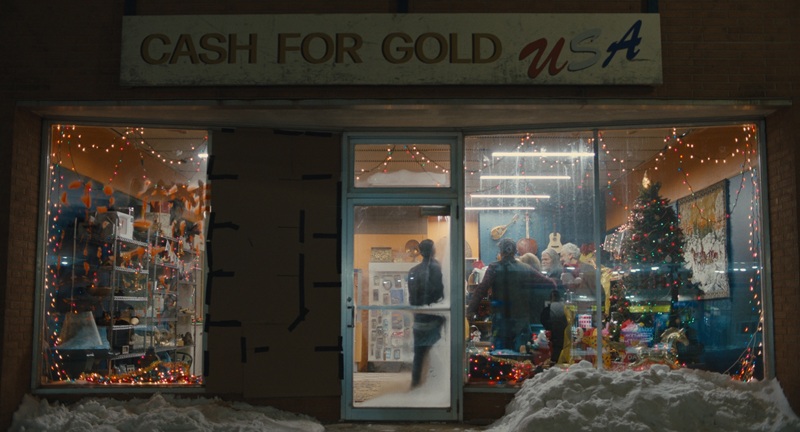Cash for Gold (Enriquez and Puette, 2024)
One belief that I have developed over twenty-some years as a film critic is that there are more talented people in the industry than there are projects able to showcase them.
The biggest argument against such a belief is the mediocrity of the majority of commercial studio releases. The biggest argument in its favor is movies like Cash for Gold.
On paper, this sounds like, at best, a holiday stocking stuffer for Lifetime or the Hallmark Channel. Grace (Deborah Puette), an economically stressed army widow, tries to keep her sobriety intact and a roof over her son’s head as Christmas draws near. The Muslim owners of a pawn shop give her a part-time job, and the characters’ complimentary forms of brokenness paradoxically pave a narrow path toward healing.
Nearly all of the plot points and story beats are predictable based on that summary, but Cash for Gold demonstrates that execution matters. Given that Puette has writing credit and directing co-credit, it appears safe to infer she is the driving force behind the project. As a writer, she gives her performers (including herself) something to work with. As a performer, she trusts the writing enough to not swing for the fences in every scene.
An example of the little touches that writing adds to conventional situations is an early scene where Grace returns to the pawn shop looking for a job. In a previous scene, she has refused what she considers a low-ball offer for a piece of jewelry but accepted the pity cash that Hasan includes when he hands it back to her. Coming back into the shop, trying to get the advertised job, she insists that she doesn’t take “charity.” Hasan, unimpressed, replies simply, “Then give me my money back.” The film has already underlined for the audience two or three times that Grace is willing to work when given an opportunity. But Puette’s writing is realistic enough to acknowledge that someone in Hasan’s position would have heard such a line many times before. Perhaps more important, the film does not simply condemn him for being wary. It presents these conventional situations but at least does the work of imagining the responses of actual, rounded characters within them. Later, when Hasan and his father realize that Grace is working multiple jobs, he tries to compliment her by saying, “You’re ambitious.” And she responds, “No, just poor.” These little bits of characterization go a long way toward keeping the audience engaged in a story that goes pretty much where you anticipate.
As Grace and Hasan warm to each other the expected xenophobic pushback from friends and family ensues. Here again, though, the racism isn’t always expressed by the characters you would expect or in the way you would expect. A subplot involving a neighboring couple that watches Grace’s son while she works nudges the film in the direction of being a full-blown soap opera, but even in its most histrionic moments there is restraint and enough respect for the difficulties of the situation that the film avoids the good-evil binary with which most melodramatic characters are painted.
Cash for Gold is not the sort of film I could ever imagine watching again, but it put Puette on my radar, and if I heard of another film she wrote or was in, I would be more inclined to watch it.

